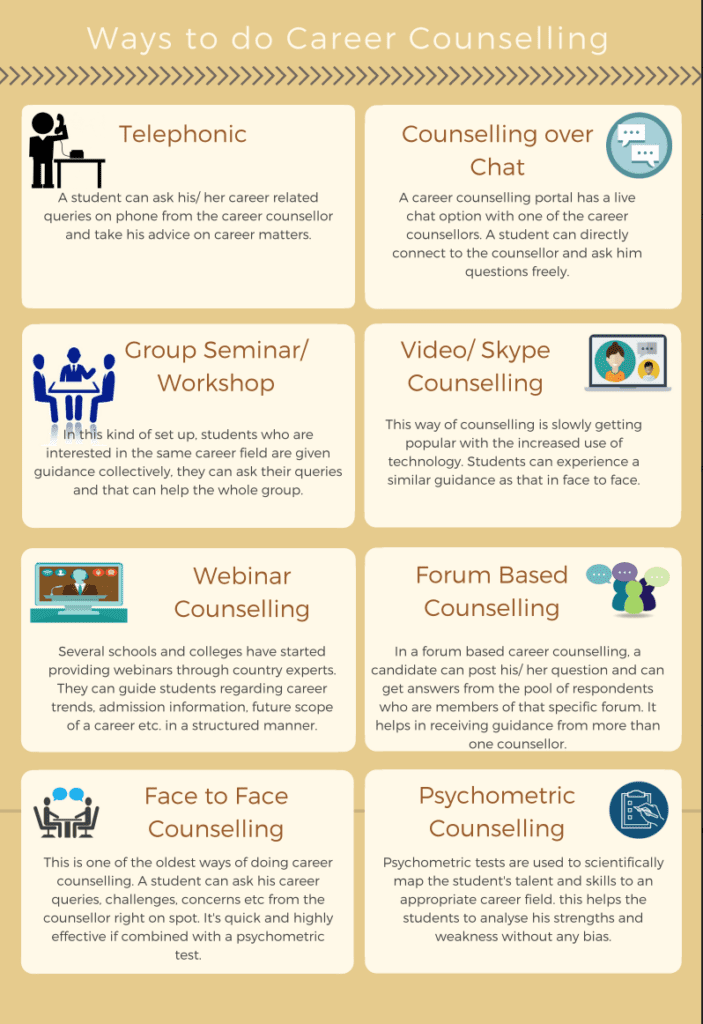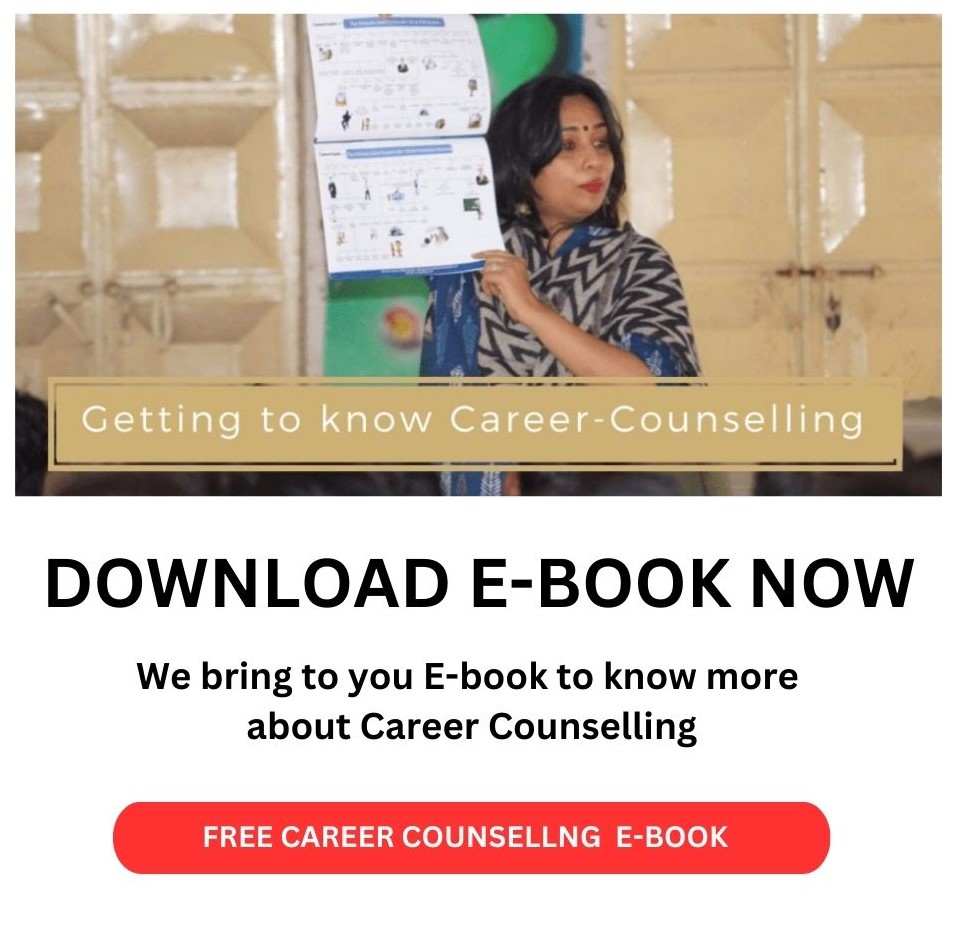The career counselling process can be divided into five parts. Each of these steps must be completed in order to be successful. The stages must also be carried out in the correct order. If you want good results, you can’t rush the career counselling process. If you’re reading this, it’s likely that you’ve reached a career fork in the road. You’re not sure which way to go, and you’re probably a little terrified as well. Seeking the assistance of a professional career adviser will enable you to make the decision you are unable to make at this time. Continue reading to learn more All About the career counselling process, which is widely recognized as a comprehensive approach.
All About Career Counselling Process
- Getting to Know You is the first step in the career counselling process
- Data Collection
- Awareness is the first step in the career counselling process
- Exploration is the second stage
- Decision Making is the third stage of career counselling process
- Preparation and Interpretation is the last stage
- FAQs About All About Career Counselling Process
Getting to Know You is the first step in the career counselling process
The initiation step is the first stage of your career counselling process. You’ll get to know your counsellor here, and he’ll come to know you as well. It’s critical to start creating a rapport with your chosen mentor or coach at this point. If the relationship isn’t working out, you’ll need to find another counsellor. This will be due to circumstances beyond your control. However, having a counsellor with whom you feel at ease is essential.
Data Collection
Both you and your caretakers or parents will be involved at this stage. Data Collection must be gathered in order to create a picture of who you are. This is accomplished in a variety of methods, including the use of questionnaires and the completion of forms. This portion of the career counselling for class 12th process may seem tedious, but it is critical that your therapist understands not just who you are now, but also where you came from to get there.
Q. Why is data collection important?
A. Data collection is important because it allows organizations to make informed decisions based on facts rather than assumptions or guesses. It can help identify patterns, trends, and correlations that may not be immediately apparent.
Q. How do you choose the right data collection method?
A. Choosing the right data collection method depends on several factors, including the research question, the type of data needed, the sample size, the resources available, and the timeline for the research.
Q. What are some ethical considerations in data collection?
A. Ethical considerations in data collection include ensuring that participants are fully informed about the study and their rights, obtaining informed consent, protecting the confidentiality of participants, and minimizing any potential harm or discomfort.
Awareness is the first step in the career counselling process
This is a critical stage in the career counselling process. You will be at ease with your selected coach or mentor at this point, and your counsellor will know a lot about you. With this information, he can begin working on steps and techniques that he will employ for the remainder of your counselling. Your rapport with your counsellor should be excellent at this point, and you should feel relaxed and at ease during your sessions. If you don’t, you probably didn’t pick a suitable career counsellor. If you’re experiencing doubts at this point, it’s possible that the counsellor isn’t qualified.
Exploration is the second stage
You’ll quickly move on to the exploration stage now that stage one is complete. You will be certain that you have chosen the best counsellor by now. You will undertake an data analysis with the assistance of your mentor throughout this stage. This level of analysis will contain various tests, and your social behavior, as well as your personality and professional preferences, will be evaluated. With this information and your work experience discussed, it’s time to move on to a one-on-one conversation with your therapist to find out what options and paths are available to you.
Decision Making is the third stage of career counselling process
Different avenues will have been investigated by this point, and a decision must be taken. You, your counsellor, and your parents must come to an agreement. Any obstacles that are preventing you from deciding on a vocation will be removed. The best possibilities for your career will be chosen, and a vital decision will be made. Without counselling, parents and children would reach a breaking point at this point. Parents frequently want their children to follow in their footsteps, and any other option is regarded as a failure. Correct career counselling will look at which option is genuinely best for you, not only your parents. Know more about Certification Course for Guiding College Students .
Preparation and Interpretation is the last stage
All options will have been explored at this point, and decisions will have been made. Now is the time to put together a game plan. This strategy will enable you to follow your chosen path and succeed. At this point, the appropriate resources will be made accessible, as well as a backup plan. Every good counsellor has a back-up plan! The plan’s implementation is the final stage of career counselling process. You will be assigned objectives and timelines to meet. This is possibly the most thrilling time for you, as well as the most nerve-wracking for your counsellor! Both he and you will be hopeful that all of your hard work will pay off and that you will no longer be stranded at a fork in the road.
FAQs About All About Career Counselling Process
Q. Why is career counseling important?
A. Career counseling is important because it can help individuals make informed decisions about their career paths, set and achieve career goals, and find greater job satisfaction. It can also help individuals navigate career transitions and overcome obstacles that may be preventing them from reaching their full potential.
Q. What are some common career counseling techniques?
A. Some common career counseling techniques include personality assessments, skills assessments, interest inventories, and values clarification exercises. Career counselors may also use a variety of other tools and techniques, such as career exploration exercises, job search strategies, and networking tips.
Q. How long does career counseling typically last?
A. The length of career counseling can vary depending on the individual’s needs and goals. Some individuals may only need a few sessions to explore their options and make a decision, while others may require ongoing support over a longer period of time.
Q. How can I find a career counselor?
A. You can find a career counselor through a variety of sources, including career centers at colleges and universities, private career counseling firms, and professional organizations such as the National Career Development Association (NCDA). You can also ask for referrals from friends, family members, or colleagues who have worked with career counselors in the past.















